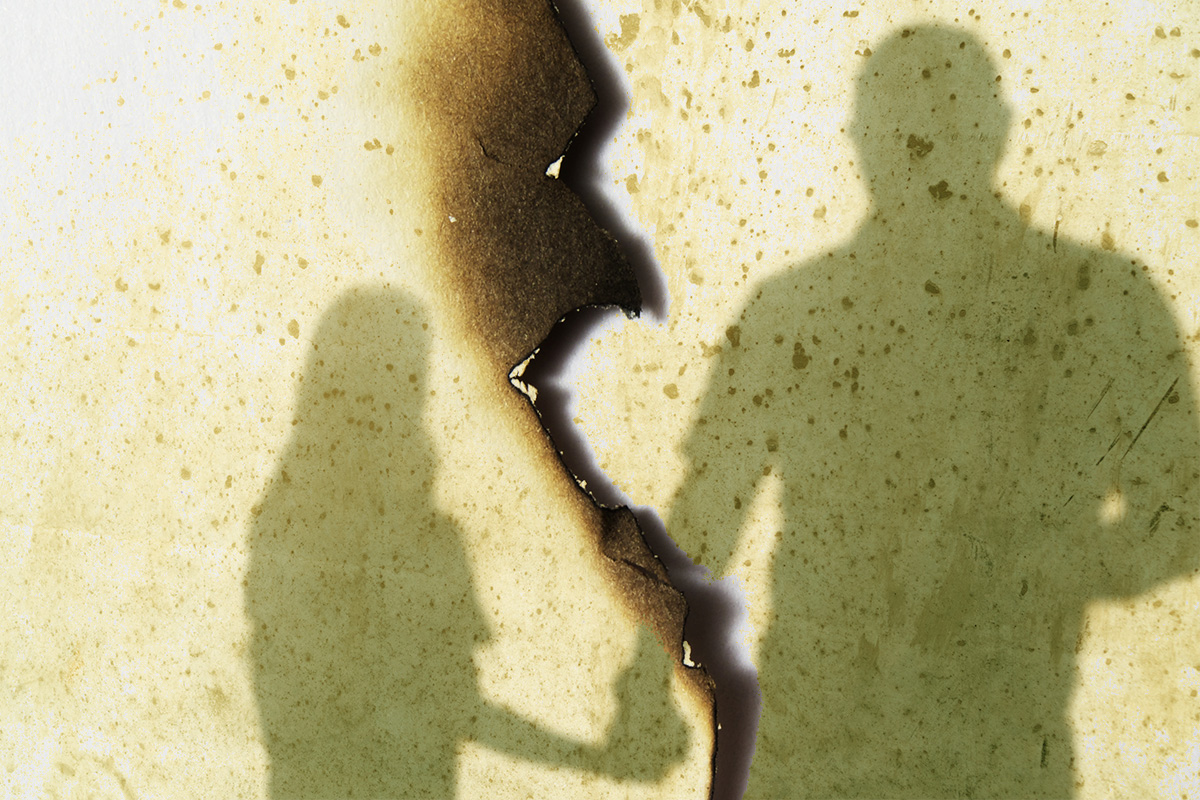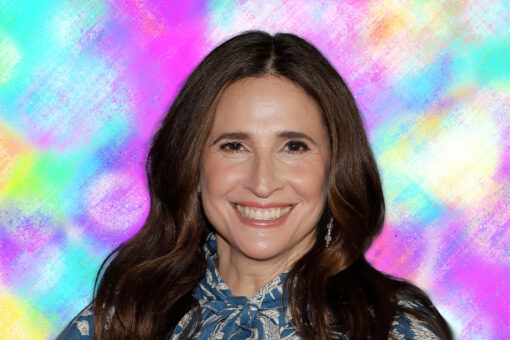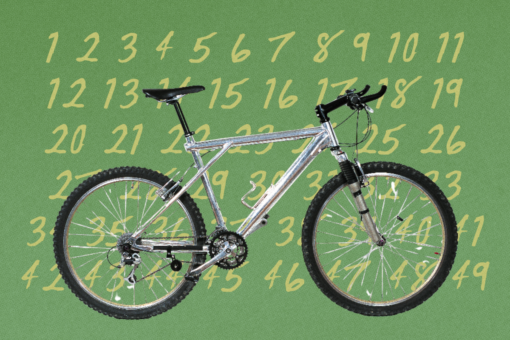February 9th, 2022: my boyfriend’s (now husband’s) birthday, and also the day I got dumped. Not by him, but by my father.
That cold and wet afternoon was stacked with Zoom calls and emails, the typical work-from-home configuration — but this one would end in a small gathering at Deliah’s, a local dive where the birthday boy would be celebrating.
Shortly before noon, I received a text from my father, to whom I will refer by the name I call him, Abba.
“Can you talk?”
Like all my other breakups before, I felt an overwhelming rush of anxiety. A sweaty mist coated my body, as if I had sprinted through a fog machine. Perspiring like the ice in the alley, I responded yes and waited for the phone to ring.
It had been a few days since we last spoke — a contentious, hour-long conversation during which I revealed to him that I had met someone. His name is Zach. He’s a writer from rural Ohio. He enjoys Marvel, but appreciates Miyazaki more. His wardrobe is almost exclusively filled with t-shirts that tell a story. He plays piano, is an Eagle Scout and has cartoonishly large calves that resemble the Disney depiction of Hercules. Zach is kind, creative and patient, and meeting him taught me what it meant to be loved unconditionally.
But none of that mattered. Zach wasn’t Jewish.
My teen years were dominated by lectures from my parents about marriage. From my Orthodox father’s perspective, my future husband must be Jewish and anyone outside the faith would bring shame upon his name. My mother, however, advised me to choose wisely and not make the same mistakes she did. A secular Jew, she traveled into the outer orbits of Judaism after taking vows, floating uncomfortably far from the world she knew. She became a symbolic warning label, and to this day, the adhesive has yet to wear off.
And still, my connection to Judaism resembled an adolescent love story: hazy, unpredictable and episodic. At times I rebelled, refusing to have a bat mitzvah if I couldn’t read from the Torah. Other times, I grew overwhelmed by a sense of belonging, profoundly captured by evening havdalah or the haunting refrain of Kol Nidre.
One Saturday evening after my parents’ divorce, I found my father curved over our beautiful white marble dining room table. The room was still dressed up for Shabbat: embroidered tablecloth, the ends of a challah enclosed in its original plastic, a folded newspaper from the afternoon, candles, crumbs. The scene of a party he hardly seemed to enjoy, but so quickly missed. Enraged, he held up a highlighted cell phone bill, brightly displaying my crime. “If you ever make phone calls on Shabbat again, I will take your cell phone away,” he threatened. Celebration followed by condemnation. This was my relationship with my father and with God.
So I had kept the secret of Zach from Abba for almost a year, fearing that my fate as his daughter would forever change once he knew the truth. The phone rang, and immediately, I answered. We picked up our conversation after a Shabbat’s worth of silence. I had hoped that the pause would give him time to reflect and pardon me with acceptance.
“I don’t understand. If he loves you, why won’t he convert?” Abba asked.
“He doesn’t want to and I’m not going to force him,” I replied. “He’s agreed to raise our kids Jewish and is open to taking a class on Judaism.”
“What about food? How are you going to keep a kosher home?”
I hadn’t kept a kosher home for years.
“We will eat vegetarian,” I replied.
“If he doesn’t convert now, he never will!” he fired back.
“It’s not that important to me that he does,” I replied, reaffirming his fear. Reaffirming his failure.
“You’re making a big mistake. I didn’t raise you this way. I think it’s best if you go your way and I go mine.”
“Are you really doing this?”
“Yes, I’m really doing this,” he replied. “It’s been a good 34 years. Have a nice life.” The conversation ended there. Hours later, with swollen eyes and a broken heart, I showed up to Delilah’s and bought Zach a birthday drink.
It has now been 11 months since I’ve spoken to my father.
In 2019, I had recently gotten out of a long-term relationship with a man who nearly won my father’s approval. I was 30, newly single and overwhelmed by the failure of a marriage that could have been. To self-medicate, I traveled abroad alone, listened to interviews with Eckhart Tolle and read passages from the Stoics. I bought a reiki package and entertained a Jungian therapist. A year later, I moved to Chicago for a new adventure, and slowly, the stitches that held together a former version of myself loosened.
Reborn in a new environment, I signed up for multiple dating apps, expanding my search beyond the confines of what I knew would be acceptable — beyond JDate. And I matched with Zach, a bearded journalist fond of beer and Berlin. We met for one drink and talked about Chicago versus New York, the musician Nils Frahm and how to prepare for my first Midwestern winter. A few days later, when news of COVID-19 dismantled our social lives, the city shut down and we lost touch.
Nearly a year went by before my friend Anna recommended that I recite Tehillim, the Jewish Book of Psalms. Her rabbi said that if one made a repetitive habit of reciting the psalms, true love would emerge. She insisted that the practice would help me find my bashert (soulmate) as it had for her.
Amused by the idea, I went on Amazon and impulsively purchased the most generic paperback edition of “King David’s Book of Psalms.” When the book arrived, I hid it in my bookshelf, camouflaged among the eclectic spines of my more displayable titles. I cringed at the thought that judaica could live on my nightstand, that I could possibly be like Abba.
“Are you reading Tehillim?” she would text.
Reluctantly, I picked up the book and began to explore the texts. I read them for myself. I read them for my father.
After a few months, I received an unexpected message from Zach. He asked me if I’d join him for tavern-style Chicago pizza. Without expectations, I agreed to meet him. The pizza was dry, but the conversation was good and we continued to see each other in the months that followed. The following year, after my breakup with my father, Zach proposed on a crowded park lawn in downtown Chicago, confirming my one true belief: God had sent me a goy.
In my attempt to integrate Jewish traditions into our secular wedding, I discovered the poetic Hebrew song “Erev Shel Shoshanim,” by Yosef Hadar and Moshe Dor. When I heard the tune, I immediately burst into tears: I knew this melody from my childhood.
I time traveled back to the windowless synagogue of my youth, where a passionate – and by this point, very drunk – congregation swayed back and forth, fervently singing during the Jewish holiday of Simchat Torah. The prayer Hu Elokeinu, Hu Avinu was set to this same melody. In my mind’s eye, I saw Abba across the mechitza (partition): swaying, sweating and, in a rare moment, smiling.
The translated text of Hu Elokeinu, Hu Avinu reads: “He is our God. He is our father, He is our King. He is our Redeemer. He is our Deliverer. He will deliver us, and redeem us once more, shortly; and in His mercy He will let us hear, in the presence of all living, proclaiming; Behold, I have redeemed you at the end of time as in the days of yore, To be to you for a God.”
Was I to be redeemed by God from marrying outside the faith? Or was I redeeming my father from casting me into darkness?
In the weeks leading up to my wedding, I played “Erev Shel Shoshanim” over and over: versions from Israeli television in the late ‘60s, by youth choirs, and my favorite, an acoustic rendition by cellist Sheku Kanneh Mason. I hummed it on the L train, in the bathtub, to my houseplants. I still cannot let go of the melody — or the memory.
As I walked down the aisle, I pressed play on my favorite version as my maternal grandparents led me towards Zach, surrounded by friends and family that have known me longer than I have known myself. It was, in some emotionally fabricated way, my way of communicating with my father — as if the sound waves traveled thousands of miles from Austin to Los Angeles, our orbits overlapped and his presence joined me in forgiveness and love. In some godly way, he heard my cry for redemption — and perhaps one day, I will hear his.



